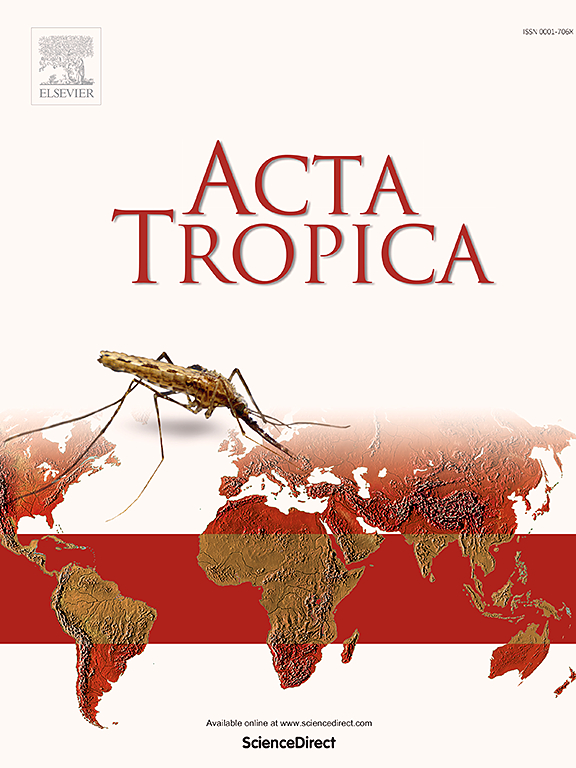Molecular evidence of Bartonella spp. in sand flies (Diptera: Psychodidae) from the Brazilian Amazon
IF 2.5
3区 医学
Q2 PARASITOLOGY
引用次数: 0
Abstract
Bartonellosis refers to a group of diseases caused by alpha-proteobacteria from the genus Bartonella, which are typically vector-borne pathogens responsible for emerging and reemerging infections in humans and animals. The transmission of Bartonella has primarily been associated with a wide variety of hematophagous arthropods, including sand flies. The present study aimed to investigate the presence of Bartonella spp. DNA in 297 non-engorged female sand fly specimens (Diptera: Psychodidae) collected in the Amazonian National Park, state of Pará, Brazil. We documented a 12.6 % (32/253) infection rate of Bartonella spp. among the sampled sand flies, using a quantitative real-time PCR targeting the 16S-23S rRNA internal transcribed spacer (ITS) region. Further molecular characterization was performed using conventional PCR assays targeting seven molecular markers (rpoB, ribC, nuoG, pap-31, groEL, gltA, and ftsZ). Phylogenetic inference grouped the two Bartonella spp. gltA sequences, detected in Psychodopygus llanosmartinsi and Psychodopygus series Chagasi, in the same clade as Bartonella ancashensis, Bartonella bacilliformis, and ancient lineages of Bartonella spp. previously detected in sand flies from Mexico and Brazil. The role of phlebotomine sand flies in the transmission of Bartonella spp. among bats and the zoonotic potential of the detected genotypes nested in B. ancashensis/B. bacilliformis clade should be further investigated.
巴西亚马逊地区沙蝇(双翅目:沙蝇科)巴尔通体的分子证据。
巴尔通体病是指由巴尔通体属α -变形菌引起的一组疾病,这种细菌通常是媒介传播的病原体,负责人类和动物中新出现和再出现的感染。巴尔通体的传播主要与多种食血节肢动物有关,包括沙蝇。本研究旨在调查在巴西帕尔州亚马逊国家公园采集的297份非膨胀雌性沙蝇标本(双翅目:沙蝇科)巴尔通体DNA的存在。利用16S-23S rRNA内部转录间隔区(ITS)的实时荧光定量PCR技术检测到巴尔通体在沙蝇中的感染率为12.6%(32/253)。采用常规PCR方法对7个分子标记(rpoB、ribC、nuoG、papa -31、groEL、gltA和ftsZ)进行进一步的分子鉴定。系统发育推断将在llanosmartinsi和Chagasi Psychodopygus系列中检测到的两个巴尔通体gltA序列与安卡什巴尔通体、杆菌状巴尔通体以及先前在墨西哥和巴西的沙蝇中检测到的巴尔通体古老谱系归为同一支系。白蛉在蝙蝠间巴尔通体传播中的作用及在安卡什巴尔通体/巴尔通体中巢型检测到的基因型的人畜共患潜力。芽孢杆菌分支有待进一步研究。
本文章由计算机程序翻译,如有差异,请以英文原文为准。
求助全文
约1分钟内获得全文
求助全文
来源期刊

Acta tropica
医学-寄生虫学
CiteScore
5.40
自引率
11.10%
发文量
383
审稿时长
37 days
期刊介绍:
Acta Tropica, is an international journal on infectious diseases that covers public health sciences and biomedical research with particular emphasis on topics relevant to human and animal health in the tropics and the subtropics.
 求助内容:
求助内容: 应助结果提醒方式:
应助结果提醒方式:


